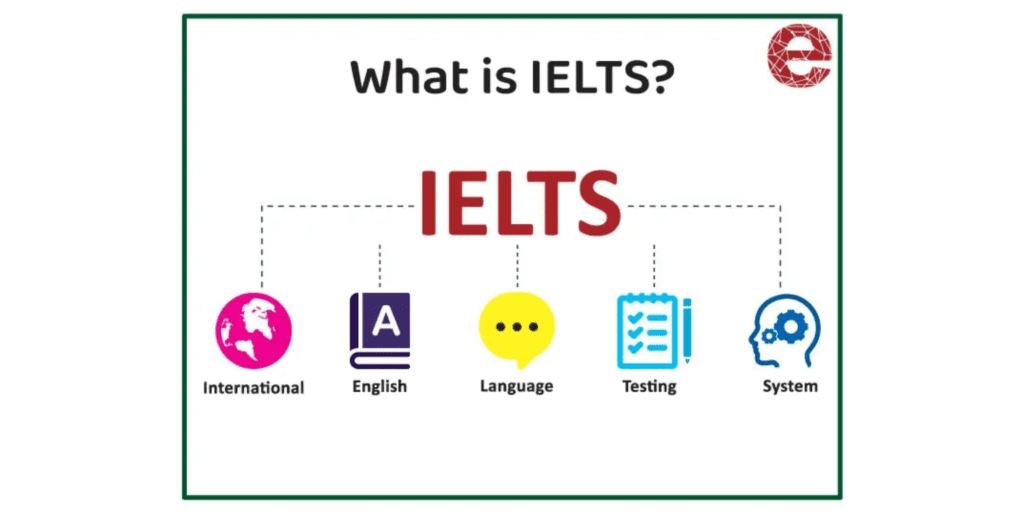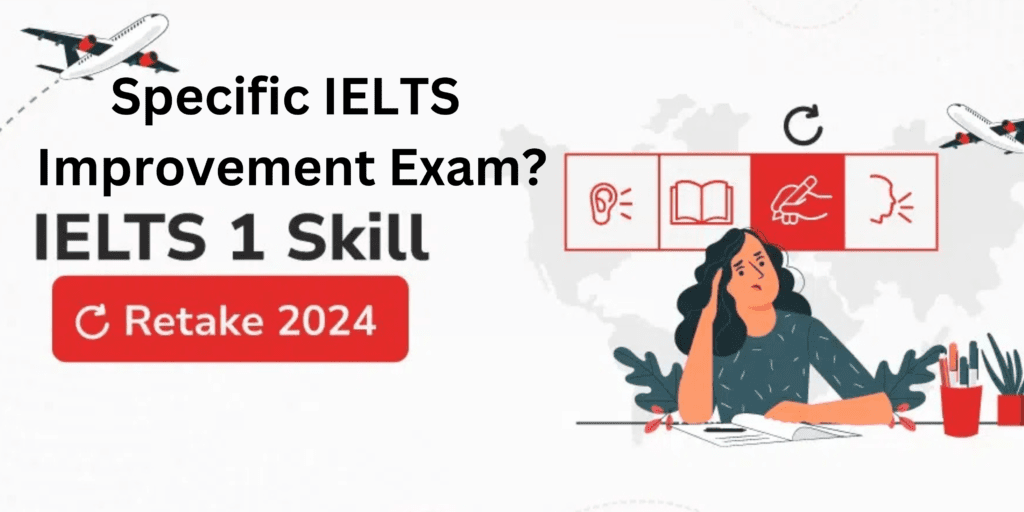
The IELTS Improvement Examination is simply where candidates take the International English Language Testing System or again to improve their exam scores. The first results of the exam do not meet the required band score that many candidates desire for their universities, jobs, or migration applications. As an important standardized test for measuring one’s proficiency in English, getting the requisite test score aligned with the needs of institutions and authorities is at stake.
There are provisions for candidates to retake the Academic or General Training IELTS test if they are unhappy with their scores. A new feature called One Skill Retake (OSR) was recently launched in select regions of the world, allowing candidates to retake only one part of the test, for example, Listening, Reading, Writing, or Speaking.Improvement in the IELTS score can be achieved through a plan of plenty reading, reviewing errors made, and improving language proficiency. Candidates preparing adequately and understand the test design will do a whole lot better when they go for a retake.
Why Take the Improvement Exam For IELTS ?
Table of Contents
Toggle
There are several reasons why candidates choose to retake the IELTS exam to improve their scores:
Discover essential tips and strategies to excel in the IELTS exam and boost your score effectively.
1. Academic and Immigration Considerations
For some universities, colleges, employers, and even immigration authorities must give an score. If you are below this mark, chances of admission, work, or even visa approval may be lost. Retaking IELTS salvages another opportunity to provide their prospective aims and could be qualifying for other band scores.
2. Boosting Band Scores for Better Opportunities
A better score in the IELTS will open doors for scholarship eligibility, job opportunities and strengthen application profiles for study programs abroad. The desired aggregate score for some institutions is usually 7.0; hence throes must aim to go higher.
3. Confidence and Performance Boost
Numerous candidates feel jittery or unprepared in their first attempt at IELTS. Retests help build up confidence and inculcating knowledge about the exam structure that, in turn, helps to ease anxiety and thereby perform well. The second attempt also offers an opportunity to mend the earlier underperformance and strengthen the overall test strategy.
4. Possibilities of the One Skill Retake (OSR)
For candidates who did well in all modules except for one, this option is beneficial as they do not have to retake the entire test again. They simply have to focus their attentions on the section they did less than expected in, thus saving time and effort.
5. Improvement in English Skills
It is easy for candidates to polish their English when preparing for improvement examinations, such as IELTS. Regular reading, writing, listening, and speaking practice would form a pillar of language proficiency on which one could stand to hope for a high score. This would be equally beneficial in the real life, both academic and professional.
For instance, candidates may decide to retake the IELTS as part of their strategy to gain admissions into their preferred institutions. With enough practice and well-laid plans in a soundly structured program, candidates have chances of improving their performance and increasing the level of success..
Is There a Specific IELTS Improvement Exam?

The IELTS Improvement Exam doesn’t refer to a different test; rather, it refers to retaking either the IELTS Academic or the IELTS General Training. If a candidate is unhappy with their score, he or she simply needs to register again for the test and try for a better one.
But recently, in select centers around the world, introduced an option called “One Skill Retake” (OSR), allowing candidates to reattempt only one of the sections: Listening, Reading, Writing, or Speaking. This is truly useful for candidates who fared well in three sections but felt weak in one because it saves their time and energy while allowing them to improve their overall band score.
Key Differences Between Full Retake and One Skill Retake (OSR)
- Complete IELTS Re-take: Candidates have to retake all four sections (Listening, Reading, Writing and Speaking) again. This is suitable for those candidates who want to have much-improved scores on several sections.
- One Skill Re-attempt (OSR): Candidates will retake just one section of the exam: this is an option for them if they need improvement in a single module.
How to Register to Exam For IELTS Retake
- Candidates are required to check the official website for IELTS or a test center of their own choice for registration for a retake.
- For a full retake, they will need to book a test date for retaking all four sections. If One Skill Retake is available in someone’s area, then they are free to choose.
- Candidates should prepare well for the retake in order to have a better chance for improvement.
Factors to Consider Before Retaking IELTS
- Time and Costs: Extra expenses and more time should be allocated to prepare again for the exam. Candidates need to figure out if they are needed to rewind the whole exam or majorly concentrate on certain module enhancement.
• Score Requirements: After all, candidates should understand those minimum scores required by the respective universities, employers, or immigration programs before taking the re-examination schedule.
• Preparation Strategy: Best preparation for IELTS retake is identifying weak areas and focusing on improving them using practice tests, tutorials, or independent studies.
While there no separate IELTS Improvement Exam, Students can follow focused preparation, get expert guidance and apply test-taking strategies to substantially improve the final score. Whether they go for a full retake or One Skill Retake, structured approach to studying can enable candidates to achieve desired IELTS band scores.
How to Improve Your IELTS Score Before Retaking
Reanne taking the IELTS will be used as preparation to score even better on the new test. Go on and take time out to examine your previously marked attempt; it will build up your weak areas strength-wise. Also, if you confirm that your scores don’t really reflect your performance, you may consider an Enquiry on Results (EOR).
It’s going to take time to be brushed up on every aspect of English: reading, writing, speaking, and listening-for the next few months. Watch English-language films. Listen to different podcasts. Read everything as extensively as possible to develop understanding. Using full-length practice tests under exam conditions, manage your timing more efficiently, and work on accuracy. An expensive preparation course or private tuition will help you with that, along with whatever other assistance and direction it can give.

Analyze Your Previous Performance
Before retaking IELTS, it’s very important that you analyze your previous performance. So try to analyze the test results to understand where you need to improve. When a student does not do so well in a particular module, being able to analyze why he scored as he did becomes really important.
One way of reassessing your score is to go for an Enquiry on Results (EOR) for your testing to be re-evaluated by the examiners. Use it if you think your score did not reflect your best performance in Writing or Speaking.
Also, consider keeping a study journal in which you log common errors, comments made to you by tutors, and progress over the years. Analyzing past performance will give you a study schedule that is properly structured according to your weaknesses.
Improve Your English Skills
Any improvement in general English may only further assist in a better IELTS score. Practice your three major skills-reading, writing, speaking, and listening-each day, with some slightly varied focus from day to day.
Go reading from newspapers, blogs, and academic articles to refine comprehension and vocabulary.
Listen to English movies; Podcasts are also good for listening practice. Interaction with native speakers or joining an English discussion circle helps to fluently converse and speak. Practice speaking aloud, record your voice, and meet with English speakers to cultivate confidence.Writing includes essays, reports, and letter writing for any needed prompt. This also includes corrections to grammar, coherence, and vocabulary use. Comments from tutors or language partners may help you immensely in improving the overall structure and clarity of your writing.
Take Practice Tests
The major method of preparing for retaking would be sitting for practice tests in their full length, simulating real exam conditions. It helps you learn about timing and getting familiar with the format.
Keep doing the practice tests and keep track of your scores. This helps you determine progress as well as adjust your study plan accordingly. Analyzing the mistakes and working on weaknesses will help keep you consistently improving.
Authentic IELTS materials and websites for online practice tests, sample answers, and examiner commentaries should be used. Mock tests simulate the pressure of a real exam and help you feel prepared on test day.
Enroll in Exam For IELTS Preparation Courses.

1. Analyze Your Previous Performance
Prior to the retake, it is highly beneficial for you to conduct a comprehensive analysis of your past performance. Think about your prior test results and identify areas that need improvement. If some test modules have been particularly difficult for you to overcome, understanding the reason why the score was awarded is pertinent.
For score reassessment, an inquiry on results (EOR) can be requested so that another review of your results is performed by IELTS examiners. Use this option if you feel your Writing or Speaking scores were not a true reflection of your best performance.
A study diary will also help track common errors, feedback from your tutor, and progress over time. With the performance analysis, you can work on a systematic study schedule that will effectively target your weaknesses.
2.Improve Your English Skills
Analyze what you have done in the past relevant to IELTS in order to assess your performance and to therefore see in which area you may need to work on more. Test results must be thoroughly scrutinized so that you can truly fathom what could have led to certain scores being low. Where a certain module was tough to handle, it would now be pertinent to dig deeper into the reasons behind what the score portrays.
Cross-check the received score with the EOR so that IELTS examiners would re-evaluate the test. This should only be enacted if you are sure that your Writing or Speaking score is not a true reflection of your ability.
Maintain a diary for analytical studies and record consistent errors, tutor comments, and general progress through time. Revenue from the past gives you a glimpse of creating a structured study plan on which to base your efforts to tackle the weakness.
3.Take Practice Tests
The major method of preparing for retaking would be sitting for practice tests in their full length, simulating real exam conditions. It helps you learn about timing and getting familiar with the format.Keep doing the practice tests and keep track of your scores. This helps you determine progress as well as adjust your study plan accordingly. Analyzing the mistakes and working on weaknesses will help keep you consistently improving.
Authentic IELTS materials and websites for online practice tests, sample answers, and examiner commentaries should be used. Mock tests simulate the pressure of a real exam and help you feel prepared on test day.
4.Enroll in IELTS Preparation Courses
Joining an IELTS preparation course is a good source for building skills in an organized manner with professional guidance. Several online and offline courses train students from the basics and provide a lot of input through mock tests to help improve the performance of candidates.Identifying weaknesses and giving solutions for acting on them can be carried out by a tutor. Besides this, attending workshops or forming study groups can really add to the study experience.
Choosing the right IELTS preparation course will guarantee students get quality study material and input from respective mentors all aimed at targeted exercises to uplift their band score. The online platform also includes a self-paced course so candidates can study at their own convenience..
Use IELTS-Specific Strategies
Enrolling an IELTS prep course helps in building the skills in a structured manner, with proper professional advice. Many online and offline courses are available for learning from the scratch. These courses provide quality training through mock tests to step up their performance. The personalized tutor can find out the weakness of a student and recommend it for improving. workshops or study groups will definitely add some value to the understanding of the students.
Opting for the right IELTS preparatory course will leave nothing behind in terms of quality study materials and appropriate expert guidance through specific exercises to aid an increased band score. Also, many online sites provide self-paced courses for the convenience of the candidates.
Conclusion in Exam For IELTS.
If you’re looking for an improved score on the exam, consider special strategic planning for post-test activities. Full test retake or One Skill Retake (OSR), expend most efforts in weighing how to improve the respective lesser person skills that need to heal. Effectively, this would establish an ongoing preparation, strict practice, and focused learning strategies to test higher.
Before retaking the IELTS test, do a self-assessment of specific weaknesses. Perform an analysis of previous scores to establish areas of improvement. Seek the feedback of a tutor or coach on the writing and speaking modules only if their expertise would really benefit you. Do not work on an overall study plan but rather devise an improvement strategy according to your needs.
Next, simulate actual conditions for the exam. Practice full-length, time-limit tests to maximize time-management skills and minimize any anxiety on the test day. Improve the language skills through wider avenues, including reading news, watching informative videos, or chatting in English within a friendly setting.
Understanding the test format and assessment criteria makes a big difference; in fact, probably the only difference that matters! Special tricks apply to each section: for Reading, it is skimming and scanning; for Writing, structural responses; for Listening, active listening; for Speaking, fluency-building exercises. Mastery of these skills will go a long way in determining overall effectiveness in the IELTS.
Are you prepared to score higher in Exam For IELTS?
Then do not waste any time; it’s time to get started studying for an IELTS-improvement examination with developed study plans; expert guidance; and focused practice. It just got made shorter to reach your dream IELTS score. Pick the right way and put in the effort, and you will be on your way to acquiring your score for academic, professional, or immigration purposes. Just stay systematic, consistent, and positive!
